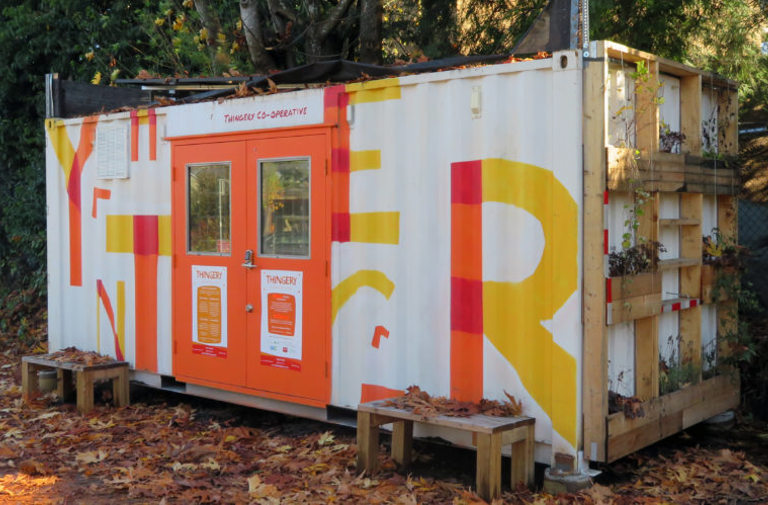It turns out, a shipping container can change a community. That’s all Chris Diplock, the co-founder of the Vancouver Tool Library, started with when he created The Thingery, a place for residents of that Canadian city to borrow equipment of all kinds, including high quality camping and backpacking gear. The project started with one container in 2018; by the end of summer 2020, they will have 13 Thingeries spread throughout the city of Vancouver and the lower mainland of British Columbia — all community-owned and self-serviced.
The Thingery’s membership model is designed to be affordable: Members pay a lifetime membership fee of $10, and a monthly fee of less than $7. The equipment also requires minimal borrowing fees, but generally The Thingery offers the opportunity for people to use equipment regardless of their ability to afford to purchase and store it.
“We buy a $600, four-season backpacking tent. That’s something you’re probably not going to spend $600 on. It’s drawing people in,” says Diplock.
For young, urban professionals living in small spaces, with limited disposable income, The Thingery is appealing. “We see a lot of people who live in high density neighborhoods — apartment dwellers. Because space is a real concern for them; they just don’t have the room,” he said. Many of The Thingery’s members are between the ages of 20-40, and are familiar with other forms of sharing, like ridesharing or carsharing.
Diplock sees a distinction between The Thingery and much of the recently monetized sharing economy, however, especially rental services. “The big line in the sand is, is accessibility and inclusivity a key part of the social purpose? Is that present in the business charter?”
The Thingery reaches lower-income communities by providing a more reduced price-point than many renting services, and working with local community centers and other social service providers.
Education is also a key component of The Thingery’s inclusivity work, Diplock explained. The Thingery doesn’t just offer equipment; it holds workshops for people to learn how to use the tools, something Diplock has seen a hunger for from members.
“A lot of people are just unfamiliar with the basics of woodworking, outdoor skills, [and] camping. And it’s an accessibility issue for everyone,” he said. Over this past summer, The Thingery held a series of repair cafés and workshops, including an introductory workshop on tarps and knots for camping. The workshop sold out three months ahead and had a wait list of 65 people.
As The Thingery continues to expand, Diplock would like to see the project extend past urban and semi-urban areas into rural communities. The Thingery went on tour last summer throughout rural Canada to educate people about the project and gauge interest. Diplock was thrilled to see how interested people were in seeing The Thingery come to their community, even in areas where people have more space to have equipment of their own and may not be as familiar with the sharing economy.
“If you’re in a rural community and you’re talking about this, we need people who are going to donate their stuff to [the project]. So we want a mix of donors and borrowers. We heard that in rural communities, people would walk up and say, ‘I have two garages full of this stuff, why would I borrow from you?’ But that wasn’t alarming… for me that is an opportunity.”
The Thingery also partnered with public libraries on their tour, which helped to break down barriers and make connections with community members.
“In a lot of small towns, with 2,000-10,000 people, the public library is a centerpiece. It is a place where everybody goes… so if we align what we are doing with equipment lending through public libraries, I think it makes perfect sense,” said Diplock.
This article is cross posted with permission from Shareable.net.





